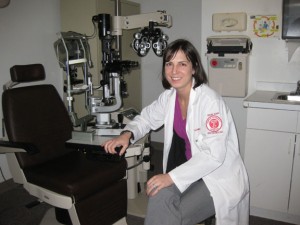By Elena Gambino
For Katie Schrack ’03, practicing medicine is all about being well-rounded. After graduating from Jefferson Medical College in 2007 and completing a residency at Crozer Chester Medical Center, she has been serving as chief resident in the department of ophthalmology, Temple University Hospital and School of Medicine in Philadelphia since June. And, the job description is certainly diverse.

Katie Schrack '03 at Temple Medical Center
Schrack was chosen from a group of nine residents in the ophthalmology department. Her responsibilities range from seeing patients and managing other residents to coordinating lectures and working closely with the faculty on a daily basis. “Becoming chief resident takes a lot of hard work in medical school and knowing how to go the extra mile to become involved with the people in the field,” she says. “The responsibilities are a lot to manage, but I definitely felt prepared for the job once I got here.”
Ophthalmology is a specialty that deals with the anatomy and diseases of the eye. It requires doctors to skillfully handle every step of a patient’s treatment, from general exams to the most complex surgical techniques. That wide range of patient care is one reason the field is so appealing to Schrack.
In addition, it is one of the most rapidly changing specialties. “There is so much still being discovered about the human eye,” says Schrack, “and many new technologies are being developed to correct problems with the eyes.” These developments, mostly in refractive surgery, include such techniques as LASIK and intraocular lenses.
As a resident, Schrack is under the oversight of attending physicians. Two of these are fellow Lafayette alumni–Dr. Edward H. Bedrossian Jr. ’73, an ophthalmologist and ocular surgeon with the Wills Eye Institute, Philadelphia, and Dr. David Larned ’73, an oculoplastics specialist. “Dr. Bedrossian is very giving of his time, which is outstanding from a resident’s perspective,” she says. “And Dr. Larned has been a great role model. He’s really skilled at oculoplastics, which is like an art, and has a witty sense of humor that makes coming to work fun.”
The challenge of handling so many medical techniques and being an effective manager makes being chief resident exciting for Schrack. At Lafayette, as a Marquis Scholar and soccer player, she gained experience striking the same kind of balance.
“Juggling sports and academic opportunities at Lafayette taught me to be hardworking and effective, and how to be somebody that my co-residents want to work with every day,” says Schrack, who received a B.S. in neuroscience with a minor in Spanish.
Schrack says the Marquis Scholar program helped her recognize which specialty would be of most interest to her. Though she knew she wanted to go to medical school, the program enabled her to take advantage of the broad range of resources Lafayette offers. “One of the best things about Lafayette is its small size, which makes it tight-knit and easy to get involved in many different things.”
For Schrack, who will complete her residency later this year, that kind of involvement has become a way of life.
